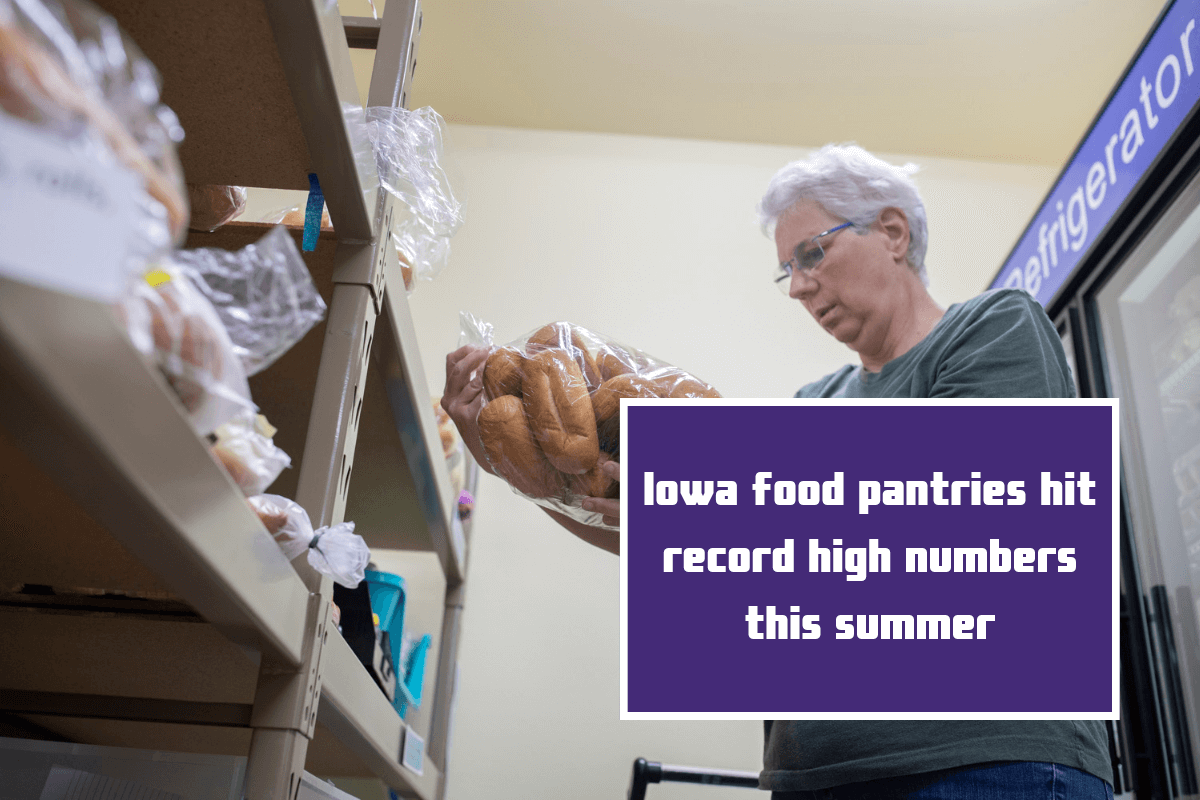In Lisbon, Iowa, schoolchildren asked the Southeast Linn Community Center for meals during the first week of summer break. Executive Director Nicole Mc Alexander claimed that scene was unprecedented.
Lisbon is one of many rural areas that did not receive a summer meal site after Iowa Gov. Kim Reynolds’ administration did not apply to join a new federal program that provides direct food aid to families during summer break. Reynolds’ administration expanded the state’s summer meals program.
Summer EBT, also known as SUN Bucks, gives qualified families $120 per child per month on a credit-like EBT card for groceries.
Reynolds filed a waiver on Aug. 15 to opt out of the federal meal program and supply food boxes for state-wide pickup.
The state would have paid $2.2 million to operate the federally funded program. The state might have gotten $29.4 million in federal program funding.
Reynolds stated in a December news release that an EBT card does not promote nutrition during a childhood obesity epidemic. In trial programs, USDA summer EBT programs reduce kid hunger and promote healthier diets.
This summer saw the first national EBT offering. Iowa households receiving free or reduced-price school meals during the school year qualified for the program.
Reynolds gave $900,000 in competitive grants to local nonprofits to offer summer meals to state schoolchildren instead of SUN Bucks.
The Summer Food Service Program and Seamless Summer Option were used to introduce more summer meal outlets in school districts and other approved organizations.
The governor’s program added 61 meal venues to Iowa’s over 500, according to an August news release. Mc Alexander and other local food pantry officials think this program is insufficient and that Iowa’s food poverty has grown without a summer EBT program.
Mc Alexander said her community lost Summer EBT or a summer meal location, leaving families who cannot go to Cedar Rapids or Iowa City without a solution. As in community centers and food pantries across the state, Mc Alexander’s food insecure residents have relied significantly on the center.
The Lisbon center distributed 5,232 pounds of food in July 2024, up from 4,000 pounds in July 2023. She said pantry stocking expenses had risen in two years.
Food pantries across report a rise in community members facing food poverty and seeking assistance.
The latest Feeding America data shows that 111,000 Iowa children—15% of the state’s youth—were food insecure in 2022.
Michelle Book, president and CEO of the Food Bank of Iowa, attributed the summer increase in need to the fact that 42% of Iowa households qualified for free or reduced lunch and Summer EBT. Summer school no longer provided 10–15 meals per week for these families.
“Those families are going to pantries or meal sites, and sometimes they’re doing without because they haven’t had the assistance this summer to fill that meal gap their kids are missing from school,” Book said.
According to the Iowa Hunger Coalition, the Summer EBT program would have helped 245,000 Iowa families feed their children. Reynolds estimates her trial feeding initiative will help 300,000 Iowa families.
Local food pantries and community organizations blame the lack of a Summer EBT program for increased summer needs. Other causes of food insecurity include rising prices, stagnant earnings, and pandemic benefits expiring.
Record-breaking summer for pantries
July was the busiest month for the Des Moines Area Religious Council Food Pantry network, which handles 14 partner food pantry sites, in nearly 50 years.
Blake Willadsen, Des Moines Area Religious Council Food Pantry marketing and communications manager, said the network helped 28,000 people that month.
In July, Willadsen reported that 36% of Des Moines Area Religious Council Food Pantry customers were under 17. About 9% were first-time food pantry visitors.
One in three people utilizing the network have never visited a food pantry before this year, which is unsustainable, Willadsen added.
Summer record-breaking patterns were seen at several local food pantries. Willadsen and other food pantry directors said their groups have seen a steady increase over the past two years after food stamp payments were reduced, the Child Tax Credit ended, and Summer EBT ended.
The North Liberty neighborhood Pantry increased food distribution to food-insecure neighborhood members in two years. The pantry temporarily stocks food in local eateries and grocery stores due to the sudden demand. The pantry is undergoing a $4 million expansion to increase storage.
In July, the North Liberty Community Pantry provided a record 64,000 pounds of food, and executive director Ryan Bobst attributed this to local households losing Summer EBT benefits.
The pantry reports that 41% of its clients are youngsters and that 99% would have gotten Summer EBT payments.
“Families continue to struggle with the price of food, and not having those benefits and food assistance makes it harder,” Bobst said. “They’re receiving more food from food pantries than before.”
According to Coralville Community Food Pantry Executive Director John Boller, food distribution increased 24% in the past year from 804,589 pounds to 997,790 pounds.
Boller said the pantry replenishes its goods, but increased demand makes it challenging to maintain fresh produce and milk in stock.
“There’s really no such thing as a slow day anymore,” Boller added. “Our shelves and coolers are stocked at shift start. Sometimes it seems naked after an hour.”
In its second summer, the pantry offers summer lunches. The pantry gave over 1,600 meals in 2023 and 2,500 this year. The pantry’s summer meal site fed 130+ kids. Boller called this number “just a drop in the bucket” compared to summer support needs for kids.
“Summer lunch sites are really valuable, but they can’t stand in for the impact that Summer EBT usually has,” Boller said of eliminating Summer EBT and other food insecurity programs.
Criticisms of summer meal sites
Anti-hunger groups have criticized Reynolds’ meal site program for having access issues and few food options for parents.
Reynolds praises the creation of 61 new state meal venues. This summer, 21 meal sites were added due to site closures, bringing the statewide total to 533.
For families lacking transportation to summer meal places, the governor’s latest proposal includes delivery.
The Iowa Hunger Coalition’s executive director and Des Moines Area Religious Council lobbyist Luke Elzinga referred to a $100 million USDA funding program to help states reduce Summer EBT administration costs.
Every state gets $1.1 million, which Elzinga said will cover half of Iowa’s administrative costs in the first year.
Elzinga claimed Summer EBT benefits will prevent Iowa’s food banks from seeing record-high demand.
“Summer EBT is meant to complement these summer meal sites,” Elzinga added. “It wasn’t meant to replace them. Not either/or. We should use all resources to combat summer childhood food insecurity.
For grocery shopping, the Summer EBT program would have given families a pre-loaded card.
Reynolds’ plan would offer pre-packaged meal cartons, limiting dietary variety.
Elzinga said Iowans should be trusted to choose food and suit their allergy, cultural, and religious needs.
“Parents’ choice has been a big theme these past few legislative sessions,” Elzinga said. However, low-income parents can’t be trusted to choose what their kids eat, which seems out of line.
Awaiting USDA approval of waiver
Gov. Reynolds petitioned the USDA on Aug. 15 to opt out of Summer EBT and use federal monies for a summer feeding trial project.
The program would give families food boxes at organizations, food banks, and churches.
Reynolds said in an Aug. 15 news release that the demonstration project will better meet Iowa’s requirements and capabilities.
After raising eligibility to 200 percent of the federal poverty threshold, the trial scheme could feed 300,000 food-insecure children in the state. About 60,000 more than would have received Summer EBT benefits.
Reynolds noted in the announcement release that the 2025 plan builds on the summer meal site program and improves Iowa children’s health.
Reynolds chose her summer meal site program over Summer EBT because of childhood obesity in Iowa.
Iowa ranks 18th in childhood obesity in the latest State of Childhood Obesity Report.
In an Aug. 15 news release, Iowa Health and Human Services Director Kelly Garcia said cash benefits that don’t promote health, nutrition-dense food, or reach all Iowa children in need won’t alleviate food insecurity and obesity. “Our solutions to promote healthy behaviors and well-balanced, nutritious diets for children must be comprehensive and holistic.”
On Aug. 15, a USDA spokeswoman criticized Reynolds’ idea.
The statement stated a decade of demonstration projects and extensive studies prove the USDA’s Summer EBT program reduces kid hunger and promotes healthier meals.
“Through this waiver request, the governor is asserting that the state knows better than its own families about their needs,” the spokeswoman added. “The evidence-based Summer EBT program is successfully being run in more than three dozen states, territories, and tribes, helping 21 million children across the U.S. USDA stands ready to support additional states, including Iowa, in offering Summer EBT to even more kids
The USDA has not decided whether to accept Reynolds’ waiver, and no deadline is given.
Sen. Janice Weiner, D-Iowa City, introduced legislation last year to require free school breakfast and lunch and give the Iowa Food Bank Association $5 million.
No legislation advanced.
Weiner said she will reintroduce free school breakfast and lunch legislation in the future session. Weiner said legislators should help food pantries relieve the burden to serve Iowa communities.
“We pride ourselves on growing lots of food,” Weiner remarked. “We ought to feed our people.”











Leave a Reply